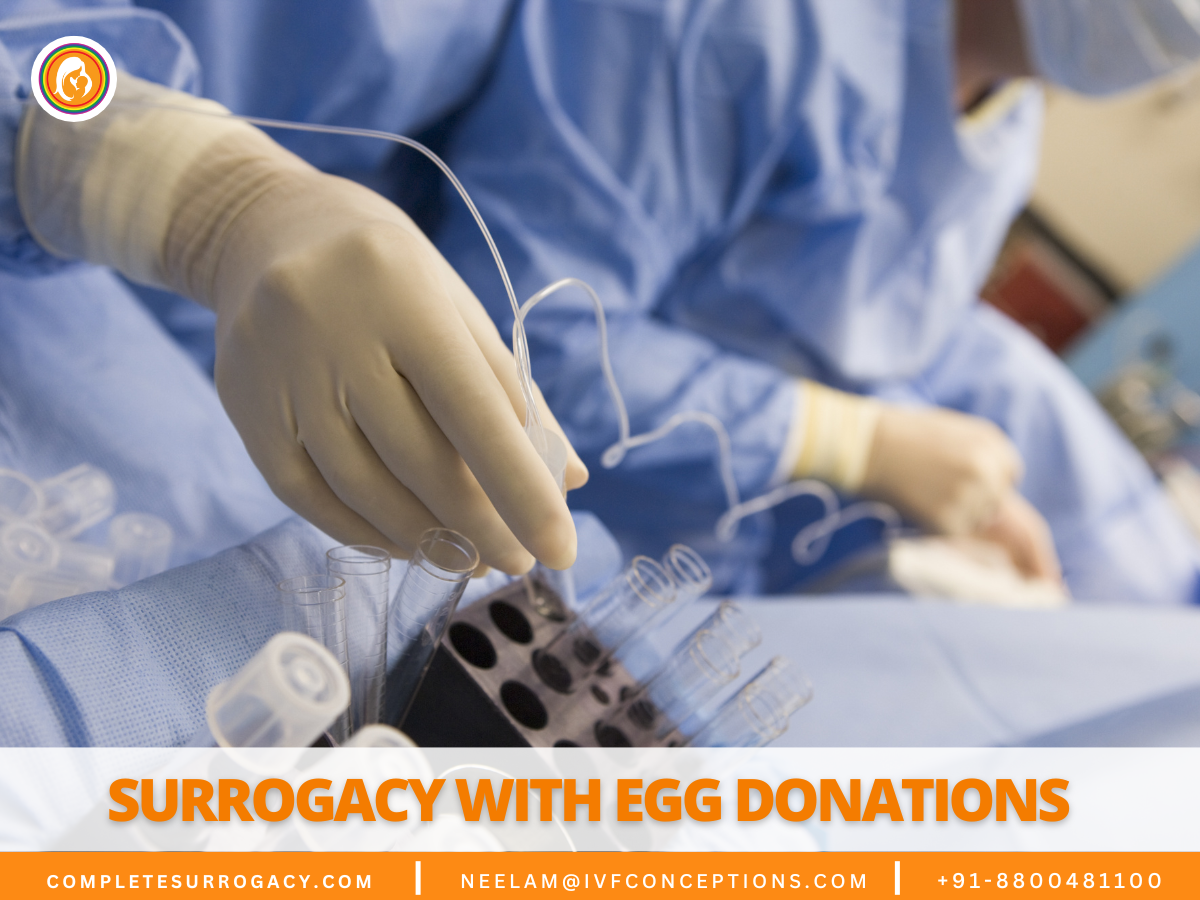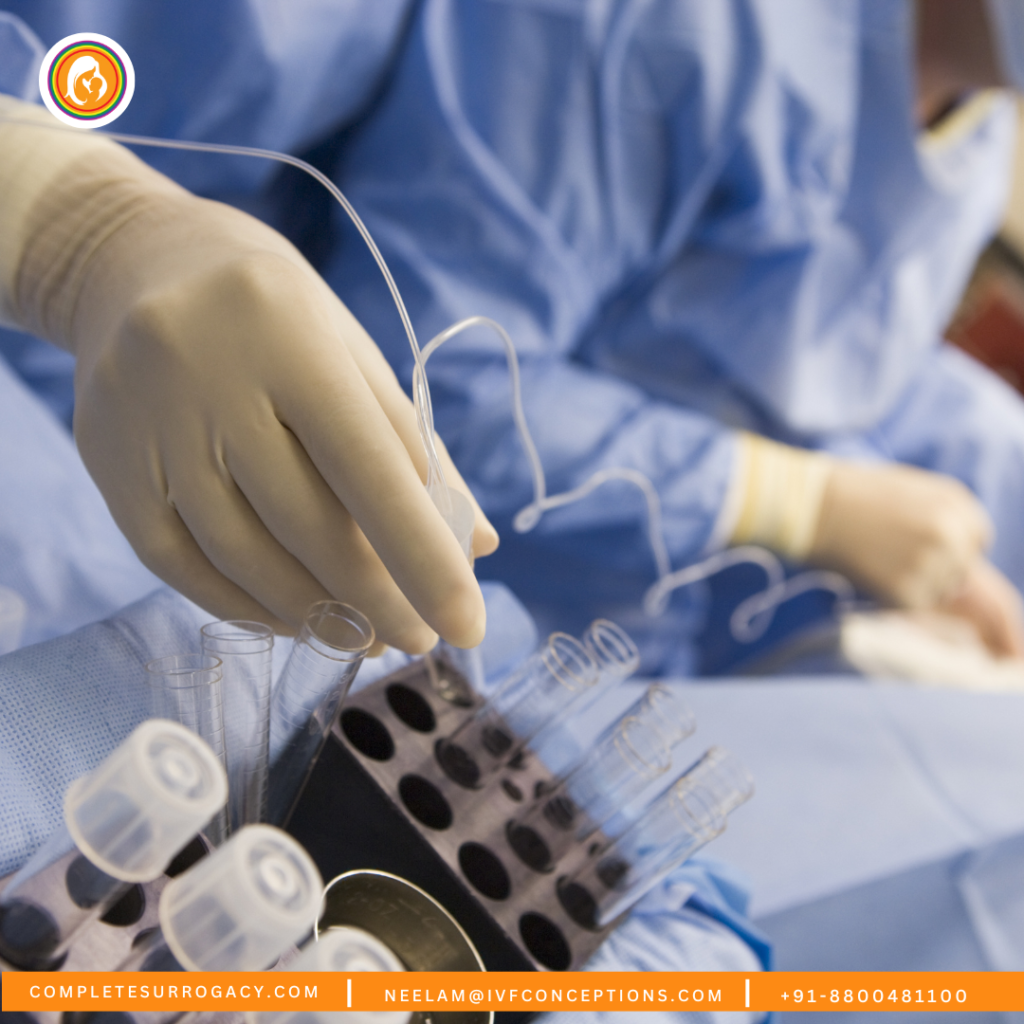Surrogacy With Egg Donations: A Comprehensive Guide for Intended Parents

Surrogacy With Egg Donations is a groundbreaking assisted reproduction method that has helped countless individuals and couples achieve their dream of parenthood. This process involves a gestational surrogate carrying a baby for the intended parents, using eggs donated by another woman. It is an ideal option for those who cannot use their own eggs due to age-related infertility, genetic conditions, or medical complications.
- Book an online appointment: Get a free online consultation.
- Call\W:+91-8800481100 Email:neelam@ivfconceptions.com
While this method offers a remarkable opportunity, it also comes with crucial considerations, including the legal process for surrogacy and egg donation, embryo transfer success rates, and the emotional and financial aspects of surrogacy. By understanding the step-by-step process of egg donation in surrogacy and the associated medical protocols, intended parents can make informed decisions and embark on this life-changing journey with confidence.
What Is Surrogacy With Egg Donation?
Surrogacy with egg donation is a form of assisted reproductive technology (ART) where an embryo, created using an egg from a donor and sperm from the intended father or a donor, is implanted into a surrogate mother. The surrogate then carries the pregnancy to term. This method is especially valuable for women who cannot use their own eggs due to age, infertility, or health reasons, as well as for same-sex male couples and single men who wish to become parents.
More Resources to Read:
Infertility Treatment and Surrogacy Process
9 Factors To Improve IVF Pregnancy Rate
International Surrogacy Options Worldwide
Surrogacy Guide for Surrogate Mothers
How Does Surrogacy With Egg Donation Work?
The process of surrogacy with egg donation involves several critical steps:

- Selection and Screening of Donors and Surrogates:
- The first step is selecting a suitable egg donor. This involves thorough screening, including medical history, genetic testing, psychological evaluation, and lifestyle assessment.
- Simultaneously, the intended parents work with agencies or fertility clinics to select a surrogate. The surrogate also undergoes comprehensive screening to ensure she is physically and emotionally fit for the surrogacy journey.
- Ovarian Stimulation and Egg Retrieval:
- The selected egg donor undergoes ovarian stimulation, where fertility medications are administered to produce multiple eggs. This process typically lasts 10-14 days.
- Once the eggs are mature, they are retrieved in a minor surgical procedure. The retrieved eggs are then fertilized with sperm from the intended father or a sperm donor using in vitro fertilization (IVF).
- Embryo Transfer:
- The resulting embryos are cultured in the lab for several days. The healthiest embryos are selected for transfer.
- The selected embryos are transferred into the surrogate’s uterus through a minimally invasive procedure. The surrogate is given hormonal support to help her uterus accept the embryo and sustain the pregnancy.
- Pregnancy and Birth:
- Once the embryo successfully implants in the surrogate’s uterus, the pregnancy progresses as any other. The surrogate will undergo regular check-ups and monitoring throughout the pregnancy.
- After birth, the intended parents are legally recognized as the child’s parents, and they take their baby home.
Timeline and Process Overview for Egg Donor Surrogacy
The entire surrogacy process, from selecting a donor to the birth of the child, can take between 18 to 24 months. Here is a simplified timeline:
| Step | Timeframe | Description |
| Selection of Donor and Surrogate | 1-3 months | Finding and screening the donor and surrogate, legal consultations, and agreements. |
| Ovarian Stimulation and Egg Retrieval | 2-4 weeks | The egg donor undergoes hormone treatments, and eggs are retrieved and fertilized. |
| Embryo Transfer | 1-2 weeks | The selected embryo(s) are transferred to the surrogate’s uterus. |
| Pregnancy | 9 months | The surrogate carries the pregnancy to term. |
| Post-Birth Legal Process | 1-2 months | Finalizing legal parentage and taking the baby home. |
Criteria for Selecting an Egg Donor
Selecting the right egg donor is one of the most important decisions in the surrogacy process. Intended parents typically consider the following criteria:
- Physical Characteristics: Traits like hair color, eye color, height, and complexion often influence the choice, especially if the intended parents want the child to resemble them.
- Health History: A thorough review of the donor’s health, including genetic and hereditary conditions, is crucial to minimize health risks for the child.
- Educational Background: Some intended parents place importance on the donor’s education and achievements, believing these could influence the child’s future abilities.
- Personality and Hobbies: Understanding the donor’s personality and interests can help parents feel more connected to the donor and the future child.
There are two main types of egg donors:
- Anonymous Donors: These are donors from an egg bank or fertility clinic. Their identity is kept confidential, which provides privacy but limits the child’s future connection to the donor.
- Known Donors: These donors can be family members or friends. This option provides a genetic link and future connection but may involve complex emotional dynamics.
Cost of Surrogacy With Egg Donation

The cost of surrogacy with egg donation can vary widely based on factors like location, the surrogate’s compensation, the egg donor’s fees, medical expenses, legal fees, and agency charges. Below is a breakdown of typical costs:
| Cost Component | Estimated Cost (USA) | Estimated Cost (International) |
| Surrogate Compensation | $30,000 – $50,000 | $15,000 – $25,000 |
| Egg Donor Compensation | $5,000 – $15,000 | $3,000 – $7,000 |
| IVF and Medical Procedures | $20,000 – $30,000 | $10,000 – $20,000 |
| Legal Fees | $10,000 – $15,000 | $5,000 – $10,000 |
| Agency Fees | $20,000 – $30,000 | $10,000 – $15,000 |
| Total Estimated Cost | $150,000 – $200,000 | $50,000 – $70,000 |
Financing Options:
Given the significant costs, many intended parents explore financing options, including:
- Payment Plans: Many fertility clinics and surrogacy agencies offer installment plans to spread out the costs.
- Grants and Scholarships: Some organizations provide financial aid to those pursuing surrogacy.
- Loans: Specialized loans for fertility treatments are also available.
Legal and Ethical Considerations for Donor Surrogacy Process
Surrogacy with egg donation involves navigating complex legal landscapes that vary by country and state. Key legal considerations include:
- Parentage Laws: Ensuring that intended parents are legally recognized as the child’s parents from birth.
- Surrogacy Agreements: Detailed contracts outlining the rights and responsibilities of the surrogate, the egg donor, and the intended parents.
- Compensation and Expenses: Regulations on the surrogate’s and donor’s compensation to avoid exploitation.
Ethical considerations include ensuring informed consent, protecting the surrogate’s autonomy, and avoiding the commodification of human life.
Emotional and Psychological Implications
Both the surrogate and the egg donor may experience emotional and psychological challenges:
- Surrogate Mother: Emotional attachment to the baby, grief after the birth, and potential post-partum depression are common issues. Ongoing counseling and support are essential.
- Egg Donor: Feelings of curiosity or concern about the child, and the psychological impact of knowing a child genetically related to them exists, may arise. Psychological screening and support are vital.
More Resources to Read:
Surrogacy Guide for Surrogate Mothers
Surrogacy Guide for Intended Parents
How does the surrogacy process work
Conclusion
Surrogacy with egg donation is a powerful and evolving option for individuals and couples seeking to build a family. It involves intricate processes and significant costs, but with careful planning, legal guidance, and emotional support, it can be a rewarding journey to parenthood.
If you’re considering surrogacy with egg donation, working with experienced professionals, including fertility specialists, surrogacy agencies, and legal experts, is crucial. This will help you navigate the complexities and ensure a smooth, successful journey to parenthood.
Certainly! Here are some frequently asked questions (FAQs) that you can include in your blog post on “Surrogacy With Egg Donations.”
If you’d like to learn more about IVF, Egg Donation, or surrogacy services globally, check out the rest of our website at Complete Surrogacy Agency. We offer legally secure and affordable surrogacy consulting services for FREE.
Complete Surrogacy: Your Trusted Partner in International Surrogacy
At Complete Surrogacy, we have over 15 years of experience in international surrogacy, guiding 4,000+ intended parents worldwide. We provide safe, ethical, and affordable surrogacy solutions for single parents, LGBTQ+ couples, and heterosexual couples.
As members of EFS and ESHRE, we adhere to the highest ethical and professional standards. Our expert team is committed to providing accurate, compassionate, and transparent guidance, ensuring a legally secure and smooth journey to parenthood.
Let us help you build your family with trust, care, and integrity.
Get in touch for one FREE Surrogacy Consultancy!

FAQs About Surrogacy With Egg Donations
1. What is the difference between traditional surrogacy and gestational surrogacy with egg donation?
Answer: Traditional surrogacy involves the surrogate mother using her own egg, making her the biological mother of the child. In contrast, gestational surrogacy with egg donation involves an embryo created from the intended father’s sperm (or donor sperm) and a donor egg, meaning the surrogate has no genetic relation to the child.
2. Who can benefit from surrogacy with egg donation?
Answer: Surrogacy with egg donation is beneficial for women who cannot use their own eggs due to age, health issues, or infertility. It is also a viable option for same-sex male couples, single men, and anyone who requires both a surrogate and an egg donor to have a child.
3. How do I choose the right egg donor?
Answer: Choosing the right egg donor involves considering physical characteristics, health history, educational background, personality, and whether you prefer an anonymous or known donor. Working with a reputable agency or fertility clinic can help you find a donor that aligns with your preferences.
4. What are the costs associated with surrogacy using an egg donor?
Answer: The cost can vary widely, but in the United States, it typically ranges between $150,000 and $200,000. This includes surrogate compensation, egg donor fees, IVF procedures, legal costs, and agency fees. International surrogacy options may be more affordable, with costs ranging from $50,000 to $70,000.
5. How long does the surrogacy process take?
Answer: The entire process, from selecting a donor to the birth of the child, usually takes between 18 to 24 months. This includes time for donor and surrogate selection, medical procedures, embryo transfer, and the pregnancy.
6. What legal issues should I consider when pursuing surrogacy with egg donation?
Answer: Key legal considerations include establishing parentage, ensuring comprehensive surrogacy agreements, and understanding the compensation regulations for surrogates and donors. It’s essential to work with an experienced attorney who specializes in reproductive law to navigate these issues.
7. Can the surrogate or egg donor claim parental rights to the child?
Answer: No, in gestational surrogacy with egg donation, the surrogate has no genetic link to the child, and the egg donor relinquishes all parental rights as part of the donation agreement. Legal contracts and court orders are established to ensure that the intended parents are recognized as the child’s legal parents.
8. What are the emotional challenges associated with surrogacy with egg donation?
Answer: Surrogacy can be emotionally challenging for both the surrogate and the intended parents. The surrogate may experience attachment to the baby, and the intended parents may face anxiety or stress throughout the process. Counseling and psychological support are recommended for all parties involved.
9. Is it possible to meet the egg donor?
Answer: Whether or not you can meet the egg donor depends on the type of donor arrangement. With known donors, there is usually direct contact. In anonymous donations, the donor’s identity remains confidential, and meeting them is not an option. However, some arrangements allow for semi-open donations, where limited contact is possible.
10. How do I find a reputable surrogacy agency and egg donor?
Answer: Researching and selecting a reputable surrogacy agency and fertility clinic is crucial. Look for agencies with extensive experience, positive reviews, and transparent processes. Consult with professionals, read testimonials, and seek recommendations from others who have undergone surrogacy.

Author Bio: Neelam Chhagani is an International Surrogacy Expert with 15 years of experience in the fertility and surrogacy domain. As the founder of IVF Conceptions and Complete Surrogacy, she has guided over 4,000 intended parents worldwide on their surrogacy journey to parenthood. Recognized as a trusted authority, she specializes in holistic infertility solutions and third-party reproduction consulting.
Holding an MA in Counselling Psychology and a PGD in Mental Health, Neelam is a proud member of the European Fertility Society (EFS) and the European Society of Human Reproduction and Embryology (ESHRE). She is also a leading surrogacy blogger, providing valuable insights into ethical and practical surrogacy solutions.
Since 2010, committed to supporting ALL family types, Neelam has been passionate about helping intended parents grow their families with compassion, integrity, and a focus on secure and affordable surrogacy options Globally.
Learn more about Neelam:
https://www.ivfconceptions.com/neelam-chhagani-surrogacy-consultant/
https://www.linkedin.com/in/neelam-chhagani-92892229/















I was introduced to Neelam by a friend who worked with Neelam for surrogacy. Neelam is absolutely wonderful. I am a single male and the journey to fatherhood is not that easy. Neelam connected me to a program ideal for my circumstances. She was with me throughout the pregnancy providing advice and guidance along the way. I am so grateful I found her and am thrilled today that I have a beautiful daughter. I highly recommend Neelam to anyone who is on a journey to become a parent. Having a child has changed my world for the better. I wish others success with their own journey and recommend you connect with Neelam to find a path that is best for you.
SA (USA)